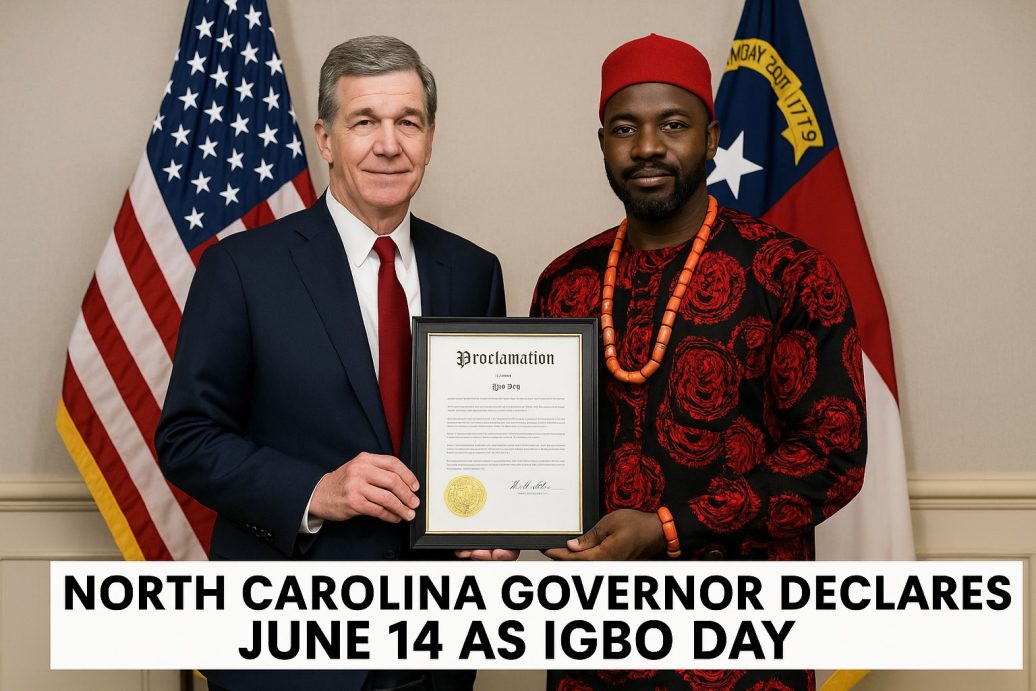
North Carolina Declares June 14 as Igbo Day Celebration ( A Historic Move or Symbolic Stunt?) or Political Tokenism?
Igbo day an unexpected move that caught global attention because it not even coming from mother nation but from a different nation, the Governor of North Carolina officially declared June 14 as “Igbo Day”, a recognition of the significant contributions of the Igbo people from Nigeria to the state’s cultural, economic, and social fabric.
For so many in the Nigerian and African diaspora have hailed the decision as a landmark celebration of cultural identity, others aren’t buying the hype. some say there’s more to this, They say it’s nothing more than a feel-good PR stunt, a symbolic gesture with little to no tangible support for immigrant communities.
So, is this a real win for the Igbo people or another example of American political tokenism dressed up as inclusion?
1. Why North Carolina Chose to Recognize the Igbo People
The proclamation acknowledges the Igbo people’s:
- Cultural richness and preservation of language and traditions
- Entrepreneurial influence in the African diaspora
- Historic ties to the American South via the transatlantic slave trade and post-immigration growth
- Present-day contributions in tech, healthcare, education, and civic leadership
Governor’s office stated that recognizing Igbo Day is part of “a broader commitment to diversity and inclusion.”
But as any politically conscious observer will ask: Why now? And why the Igbo not all African groups?
ALSO READ
Air India Crash and the Survivor
North Carolina declares June 14 as ‘Igbo Day’
2. The Celebration: A Moment of Pride for Many
Across social media, Igbo communities within and outside the U.S. erupted in celebration:
- Cultural dances, traditional attire, and community gatherings lit up Instagram and TikTok.
- Nigerian influencers and public figures praised the move.
- Igbo Americans saw this as a long-overdue recognition of their resilience, unity, and global excellence.
For many, this was more than just a declaration. It was a validation of identity in a foreign land where African cultures are often misunderstood, ignored, or homogenized.
3. Critics Call It What It Is: Political Symbolism
Not everyone is cheering.
Many Black American activists, African immigrants, and even Nigerians themselves have criticized the move, asking key questions:
- Will there be funding or support for Igbo cultural institutions?
- Will this recognition impact immigration policy or reduce systemic bias?
- Does this actually help Igbo people, or just make American officials look “woke”?
A major critic tweeted:
“This is the same state where African names still get your resume thrown out. But sure, let’s celebrate Igbo Day.”
Harsh? Maybe. But not without truth.
4. The Identity Debate: Who Speaks for the Igbo People?
The announcement also raised an uncomfortable question:
Which Igbo voices were consulted?
Many grassroots Igbo organizations in North Carolina claim they were never involved in the proclamation discussions and that the event was pushed by elite diasporans, not community elders or youth leaders.
The risk here? Turning Igbo identity into a political prop, rather than a living, breathing community with real needs.
5. American Politics and the Tokenism Trap
Let’s be real — America is no stranger to declarations without delivery.
From “Black History Month” to “Pride Month,” the U.S. has perfected the art of symbolic recognition. But behind the parades and hashtags, marginalized groups continue to face:
- Unequal access to healthcare
- Racial profiling
- Visa restrictions
- Housing and employment discrimination
Will Igbo Day change any of that? Or is it just a shiny distraction in an election year?
6. The Bigger Picture: Igbo Diaspora Needs More Than a Day
Igbo communities in America face:
- Cultural erasure
- Lack of funding for language schools
- Rising identity loss among second-generation youths
- Immigration barriers
A real commitment would look like:
- Grants for Igbo cultural programs
- Scholarships for African students
- Language preservation initiatives
- Representation in state leadership roles
Without these, June 14 is just a colorful bandage on a deep wound.
7. The Global Effect: A New Wave of Diaspora Confidence?
Despite the criticism, some positive ripple effects are undeniable. Igbo Day could:
- Inspire other U.S. states to recognize African ethnic groups
- Encourage second-gen Igbo youth to embrace their identity
- Spark global conversations about the role of diaspora in reshaping narratives
In a world where Africa is often portrayed as a monolith, this move even if symbolic forces people to confront the diversity within Black identity.
And that’s not meaningless.
WhatsnextNG Conclusion: It’s Not Just About the Day It’s About the Aftermath
June 14 being declared Igbo Day in North Carolina is, at best, a symbolic victory. At worst, it’s a political distraction.
North Carolina’s declaration of June 14 as Igbo Day has sparked both pride and controversy. While many Igbo people in the U.S. and abroad celebrate it as long-overdue recognition of their cultural identity and contributions, critics argue that it’s just another case of political tokenism a symbolic gesture with no real impact on policy, representation, or community support.
The article explores whether this move is a genuine step toward inclusion or simply part of America’s long tradition of offering performative declarations without addressing systemic challenges. It questions who really benefits from the proclamation and whether the Igbo community was meaningfully involved.
In conclusion, the piece urges that real recognition must go beyond words it should come with funding, representation, and programs that uplift the diaspora, not just flatter them.
But either way, it’s now up to Igbo communities not just politicians to decide what happens next. Will they demand more than words? Will they build on the spotlight and turn symbolism into substance?
Because real recognition doesn’t come with a proclamation.
It comes with policy, presence, and power.





